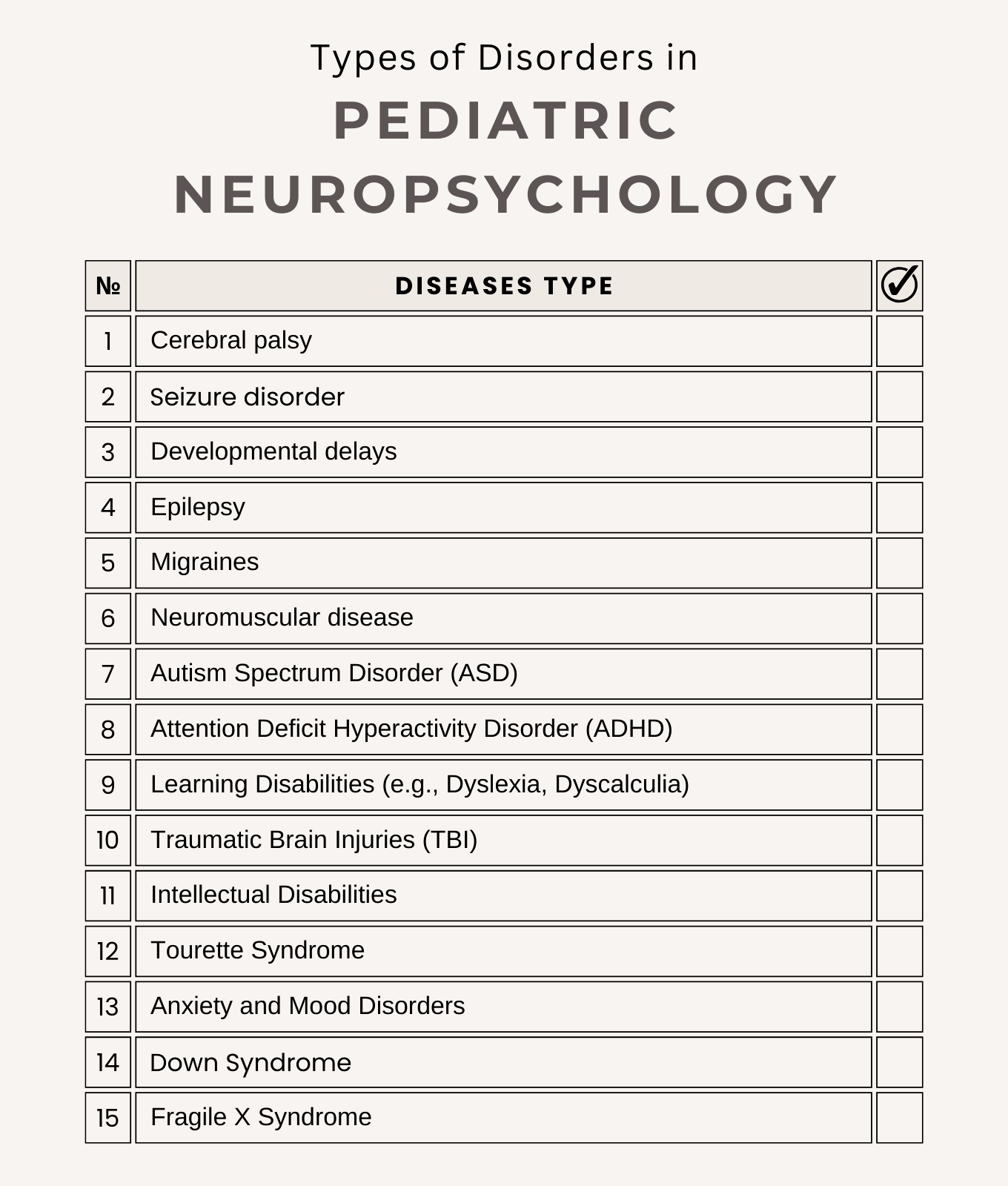Pediatric Neuropsychology and Childhood Cognitive Health are critical fields focused on understanding and supporting the mental and developmental well-being of children. Pediatric neuropsychology is a specialized field that examines how neurological and psychological factors impact the cognitive, emotional, and behavioral development of children and adolescents. This discipline combines clinical neuropsychology with pediatrics, focusing on diagnosing, treating, and managing disorders that affect a child’s brain function and, as a result, their ability to learn, communicate, and interact socially.
Disorders such as autism spectrum disorder (ASD), attention-deficit/hyperactivity disorder (ADHD), and learning disabilities typically emerge during childhood. Each of these conditions presents unique challenges that necessitate thorough diagnostic evaluations and customized intervention strategies. Pediatric neuropsychology is crucial for identifying these disorders, understanding their underlying neurological causes, and implementing evidence-based treatment plans that help children reach their full potential. The goal of this essay is to provide a comprehensive overview of common pediatric neuropsychological disorders, explore the diagnostic processes used to identify these conditions, and discuss various treatment approaches tailored to meet the specific needs of each disorder.
Table of Contents
Pediatric Neuropsychology

what is pediatric neuropsychology? Neuropsychology is a branch of psychology that investigates the relationship between the brain and behavior. Pediatric neuropsychology is a specialized area within clinical neuropsychology that focuses on how brain health influences behavior in children. Many pediatric neuropsychologists also participate in teaching, research, supervision, and the training of both undergraduate and graduate students in this field. A pediatric neuropsychological assessment is essential for understanding a child’s cognitive strengths and weaknesses.
What is a Pediatric Neuropsychologist
Pediatric neuropsychologists are licensed psychologists with specialized training in both clinical psychology and neuropsychology. They focus on understanding how the brain develops and use this knowledge to evaluate and manage children with brain disorders. These disorders may result from brain injuries, medical conditions, or developmental issues. A pediatric neuropsychological assessment is essential for understanding a child’s cognitive strengths and weaknesses.
What does a pediatric neuropsychologist do? The goal of a pediatric neuropsychologist is to identify any changes in cognitive functions while also recognizing those that remain intact, which can be utilized to help manage the disorders. For each patient, the neuropsychologist determines the most effective cognitive rehabilitation program aimed at restoring or improving cognitive function.
If your child’s teacher notes difficulties with concentration, mentions that your child often seems disengaged, or observes impulsivity in classroom activities, it may be beneficial to conduct a neuropsychological assessment. This assessment aims to identify potential attention disorders or other cognitive challenges, such as dyslexia or dysorthographia, that could affect academic performance.
The assessment typically lasts several hours and begins with a discussion involving the child and their parents. This phase, called anamnesis, provides an overview of the child’s development and highlights any difficulties they face in their daily life.
As healthcare professionals, neuropsychologists also provide psychological support to patients and their families, helping them cope with the effects of cognitive and behavioral disorders.
Neuropsychological disorders are a group of mental illnesses that affect brain function and behavior. Childhood neurological and cognitive disorders can significantly impact a child’s development and quality of life. These disorders include conditions such as dementia, Alzheimer’s disease, Parkinson’s disease, Huntington’s disease, attention-deficit hyperactivity disorder (ADHD), schizophrenia, and bipolar disorder.
Here you can listen to one of the latest and most complete episodes of the Navigating Neuropsychology podcast about pediatric neuropsychology in a conversation with Dr. Jennifer Koop.
Types of Diseases and Disorders in Pediatric Neuropsychology
Children with medical conditions that impact neurocognitive development—such as brain injuries, seizure disorders, genetic disorders, premature birth, brain tumors, respiratory issues, and exposure to drugs or alcohol in utero, as well as certain cardiac conditions—may face unique challenges.

Pediatric neurological disorders encompass a wide range of conditions, which can significantly affect a child’s development and overall well-being.
Common Neuropsychological Disorders in Childhood:
- Cerebral palsy
- Seizure disorder
- Developmental delays
- Epilepsy
- Migraines
- Neuromuscular disease
- Autism Spectrum Disorder (ASD)
- Attention Deficit Hyperactivity Disorder (ADHD)
- Learning Disabilities (e.g., Dyslexia, Dyscalculia)
- Traumatic Brain Injuries (TBI)
- Intellectual Disabilities
- Tourette Syndrome
- Anxiety and Mood Disorders
- Down Syndrome
- Fragile X Syndrome
Here we examine some of the most common of these disorders.
Autism Spectrum Disorder (ASD)
Autism spectrum disorder (ASD) is a neurological and developmental disorder that affects how people interact with others, communicate, learn, and behave. Although autism can be diagnosed at any age, it is described as a “developmental disorder” because symptoms generally appear in the first 2 years of life. people with ASD often have:
- Difficulty with communication and interaction with other people
- Restricted interests and repetitive behaviors
- Symptoms that affect their ability to function in school, work, and other areas of life
Attention Deficit Hyperactivity Disorder (ADHD)
ADHD, or Attention-Deficit/Hyperactivity Disorder, is a developmental disorder defined by persistent symptoms of inattention, hyperactivity, and impulsivity that interfere with daily functioning and development. Many studies focus on the impact of ADHD in children and how it affects their learning and social interactions.
People with ADHD experience an ongoing pattern of:
- Inattention: Having problems staying on task, paying attention, or being organized, which are not due to defiance or a lack of comprehension.
- Hyperactivity: Being extremely restless or constantly moving, including in situations when it is not appropriate; excessively fidgeting or tapping; or talking too much.
- Impulsivity: Acting without thinking, interrupting others, or having difficulty with self-control. Impulsivity can also involve a desire for immediate rewards or an inability to delay gratification or consider long-term consequences.
Learning Disabilities (e.g., Dyslexia, Dyscalculia)
A learning disability, learning disorder, or learning difficulty is a condition that affects the brain’s ability to understand or process information. Various factors can contribute to this condition. Dyslexia specifically refers to challenges in reading, particularly in word recognition and decoding. On the other hand, dyscalculia involves difficulties in acquiring arithmetic skills, especially in understanding number facts.
Learning Disabilities Every Psychology Professional Should Study:
- Dyslexia
- Dysgraphia
- Dyscalculia
- Auditory processing disorder
- Language processing disorder
- Nonverbal learning disabilities
- Visual perceptual/visual motor deficit
What are the attributes of students with learning disabilities? The following is a list of common characteristics of an LD student. Conditions must be persistent over a long period of time. Presence of these conditions does not necessarily mean a person is learning disabled.
Common signs that a person may have learning disabilities include the following:
- Problems reading and/or writing.
- Problems with math.
- Poor memory.
- Problems paying attention.
- Trouble following directions.
- Clumsiness.
- Trouble telling time.
- Problems staying organized.
Dyslexia
Dyslexia is a learning disorder that involves difficulty reading due to problems identifying speech sounds and learning how they relate to letters and words (decoding). Also called a reading disability, dyslexia is a result of individual differences in areas of the brain that process language. There is a common misconception that dyslexia only affects the ability to read and write. In reality, dyslexia can affect memory, organization, time-keeping, concentration, multi-tasking, and communication.
Symptoms of dyslexia in children aged 5 to 12 include:
- problems learning the names and sounds of letters.
- spelling that’s unpredictable and inconsistent.
- confusion over letters that look similar and putting letters the wrong way round (such as writing “b” instead of “d”)
- confusing the order of letters in words.
Dyscalculia
Dyscalculia is a learning disability that leads to difficulty in understanding and working with numbers. This includes challenges in learning arithmetic, performing calculations, and grasping mathematical concepts.
Signs of dyscalculia in grade school:
- Has trouble learning and recalling basic math facts, like 2 + 4 = 6
- Still uses fingers to count instead of using more advanced strategies (like mental math)
- Struggles to identify math signs like + and ‒ and to use them the right way
What causes dyscalculia? In most cases, especially in children, experts don’t know why dyscalculia happens. There’s evidence that learning disorders — including dyscalculia — may run in families. However, more research is necessary to confirm this.
Traumatic Brain Injuries (TBI)
Traumatic brain injuries occur when there is a direct or indirect blow to the head. They can include bumps and bruises, concussions, skull fractures and serious brain injuries. Some traumatic brain injuries cause lasting damage. But most kids recover with no long-term problems.
The risk of head injury is high in teens. Head injuries happen twice as often in boys than in girls. Head injuries are more common in the spring and summer months when children are very active in outdoor activities, such as riding bikes, roller skating, or skateboarding. Children who play sports, such as football, soccer, hockey, and basketball, are also at higher risk of concussion. Childhood traumatic brain injuries can have long-lasting effects on a child’s development and overall well-being.
What causes a head injury in a child?
- Sports injury.
- Falling.
- A motor vehicle accident, or being struck by a vehicle while walking.
- Child abuse.
- Abusive head trauma.
Read More Here:
Intellectual Disabilities
Intellectual disability, previously referred to as mental retardation and also known as general learning disability, is a neurodevelopmental disorder characterized by significant impairments in both intellectual abilities and adaptive functioning. These challenges are typically noticeable during childhood.
Children with intellectual disability may take longer to learn to use words, form sentences, and communicate effectively. Their social development can also progress slowly due to cognitive challenges and language difficulties. Additionally, they may struggle with learning basic self-care skills, such as dressing and feeding themselves.
The most common preventable cause of intellectual disability is fetal alcohol syndrome. The most prevalent chromosomal cause is Down syndrome, while Fragile X syndrome is the most common genetic cause.
Tourette Syndrome
Tourette syndrome (TS) is a neurological disorder that may cause sudden unwanted and uncontrolled rapid and repeated movements or vocal sounds called tics. TS is one of a group of disorders of the developing nervous system called tic disorders. Symptoms of Tourette syndrome often start between ages 5 and 10. They usually begin with mild, simple tics of the face, head, or arms. Over time, a child may have different tics that may happen more often. They may also involve more parts of the body, such as the trunk or legs.
Tourette Syndrome is not a mental health condition but it can certainly affect a child’s mental health. Many children have been reported to have suffered from anxiety, rages, depression, and even suicidal thoughts. Such symptoms can be made worse by factors like hormones, bullying, and change.
Anxiety and Mood Disorders
Anxiety and mood disorders in children and adolescents are common conditions that can become chronic, potentially leading to current and future functional impairment. The causes are multifactorial, often stemming from the interaction of a stress-sensitive individual in a stress-inducing environment. Genetic factors contribute significantly to these disorders, with genetic influences accounting for about 50% of the variance observed. Besides a shared genetic factor likely linked to stress reactivity, there are also specific genetic elements associated with particular anxiety and mood symptoms.
Treatment goals include reducing stress, encouraging exposure to avoided or feared situations, and practicing anxiety-reduction strategies. A wide variety of interventions can effectively alleviate both anxiety and depression, and these should be customized to meet the specific needs of the child and their family.
Cerebral Palsy
Cerebral palsy is a group of conditions that affect movement and posture. It is caused by damage to the developing brain, most often occurring before birth. Symptoms usually appear in infancy or early childhood and range from mild to severe. Children with cerebral palsy may exhibit exaggerated reflexes.
The condition is typically caused by factors that affect the development of a baby’s brain while it is growing in the womb. One common cause is damage to a part of the brain known as white matter, which may result from a reduced supply of blood or oxygen. This condition is referred to as periventricular leukomalacia (PVL).
Common types of treatment for cerebral palsy include:
- Physical therapy and rehabilitation. A child with cerebral palsy usually starts these therapies in the first few years of life or soon after being diagnosed
- Orthotic devices
- Assistive devices and technologies
- Medication
- Surgery
Genetic and Chromosomal Disorders (e.g.,)

Down Syndrome (DS) and Fragile X syndrome (FXS) are the leading genetic causes of intellectual disability. Approximately 1 in 733 infants are born with DS.
Down Syndrome
Down syndrome, also known as trisomy 21, is a genetic disorder caused by the presence of an extra copy of chromosome 21, either in part or in full. This condition is typically associated with developmental delays, mild to moderate intellectual disability, and distinct physical features.
Children with Down syndrome typically experience mild to moderate intellectual disabilities and may face particular challenges related to attention span, verbal memory, and expressive communication. Additionally, behavioral issues such as stubbornness, impulsivity, and temper tantrums may be more prevalent among these children.
Fragile X Syndrome
Fragile X syndrome is a genetic condition that leads to various developmental challenges, including learning disabilities and cognitive impairment. Males are typically more severely affected by this disorder than females. Individuals with Fragile X syndrome often experience delays in speech and language development by the age of 2. The syndrome can also result in a range of behavioral issues, such as attention-deficit/hyperactivity disorder (ADHD), social anxiety, shyness, and repetitive behaviors like hand-flapping or hand-biting.
Neuropsychological evaluation
Common neuropsychological disorders include conditions such as Alzheimer’s disease, ADHD, and traumatic brain injury. Clinical Neuropsychology is concerned with the assessment and rehabilitation of people with brain injury, neurological disease or neurodevelopmental conditions. Clinical Neuropsychologists are specially trained to understand the relationship between brain and neuropsychological function.
Individuals who have experienced traumatic brain injuries, concussions, epilepsy, or neurodegenerative conditions such as Alzheimer’s disease or Parkinson’s disease are often referred for clinical neuropsychological assessments. These evaluations provide a detailed understanding of how an individual’s brain functions and play a crucial role in distinguishing between typical age-related cognitive changes and early signs of dementia in older adults. There are several specific uses of neuropsychological assessment, including:
- Collection of diagnostic information
- Differential diagnostic information
- Assessment of treatment response
- Prediction of functional potential and functional recovery
Pediatric neuropsychology evaluation

Neuropsychology pediatrics focuses on understanding how brain development affects cognitive and behavioral functioning in children. A neuropsychological evaluation measures a child’s intellectual abilities, attention, learning, memory, visual-spatial skills, visual-motor integration, language, motor coordination and executive functioning skills such as organization and planning. It may also address emotional, social and behavioral functioning. The role of pediatric neuropsychology in diagnosing childhood learning and developmental disorders is crucial for identifying specific cognitive challenges and creating effective intervention plans.
For this age group, a neuropsychologist might use assessments like the Wechsler Intelligence Scale for Children (WISC), which measures cognitive abilities, or the Conners’ Rating Scales for ADHD-related evaluations. Insights into neurological disorders in children reveal critical information for early diagnosis and intervention strategies.
comprehensive neuropsychological evaluation typically involves:
- A full-day appointment including parent and child interviews, the evaluation itself and parent questionnaires
- A feedback session to discuss the results
- A report with many recommendations
A neuropsychological evaluation usually lasts 2 to 3 hours. During this time, neuropsychologist review information about child’s medical condition and any current issues they may be facing. neuropsychological also conduct paper-and-pencil and computerized tests to assess areas such as memory, attention, processing speed, and other cognitive functions. Specialists will gather relevant background information from both the child and the parents, engage in discussions about the evaluation, and address any questions or concerns. In some cases, testing may take longer, especially if the child has experienced concussions months before the evaluation or has suffered more severe injuries.
Parents should be open with their children about testing. Many find it helpful to explain that these tests will help identify how their children learn best, ultimately making both school and home life happier and more successful. It’s also important to remind them that no one answers every question correctly, and the key is to try their best. Assure them that there will be no scary machines or shots involved.
Finally, we suggest you learn more about one of the best pediatric neuropsychology treatment centers.
Akron Children’s Hospital Clinical Pediatric Neuropsychology Postdoctoral Fellowship.
Conclusion
In conclusion, pediatric neuropsychology is essential for understanding and addressing the intricate relationship between neurological and psychological factors in children. Disorders such as ADHD, autism spectrum disorders, learning disabilities, and traumatic brain injuries require thorough evaluation and accurate diagnosis to develop effective treatment strategies. Through comprehensive assessments, pediatric neuropsychologists can identify cognitive, emotional, and behavioral challenges, enabling tailored interventions that support children’s development and well-being. As research in this field continues to progress, the integration of innovative therapeutic approaches and collaboration among multidisciplinary teams will improve outcomes for children and their families. Ultimately, a holistic understanding of pediatric neuropsychology is crucial for fostering resilience and maximizing the potential of children facing neuropsychological disorders.
Frequently Asked Questions
Frequently Asked Questions about Pediatric neuropsychology:
Can neuropsychologist prescribe medication?
They (neuropsychologists) can help create treatment plans. But they can’t prescribe medicine.
How does neuropsychology relate to pediatrics?
Pediatric neuropsychology is a specialized field of psychology that focuses on the assessment, diagnosis, and intervention of cognitive, behavioral, and emotional disorders in children and adolescents.
Reference
https://pubmed.ncbi.nlm.nih.gov/34294470
https://pubmed.ncbi.nlm.nih.gov/32719944
https://pubmed.ncbi.nlm.nih.gov/32842849
https://pubmed.ncbi.nlm.nih.gov/38555234
https://pubmed.ncbi.nlm.nih.gov/36729053
https://pubmed.ncbi.nlm.nih.gov/21955113
https://pubmed.ncbi.nlm.nih.gov/31545988
https://pubmed.ncbi.nlm.nih.gov/32847476
https://pubmed.ncbi.nlm.nih.gov/34050361
https://pubmed.ncbi.nlm.nih.gov/33159508
https://pubmed.ncbi.nlm.nih.gov/38016484
https://pubmed.ncbi.nlm.nih.gov/38748847
https://pubmed.ncbi.nlm.nih.gov/38966186
https://pubmed.ncbi.nlm.nih.gov/38783484




